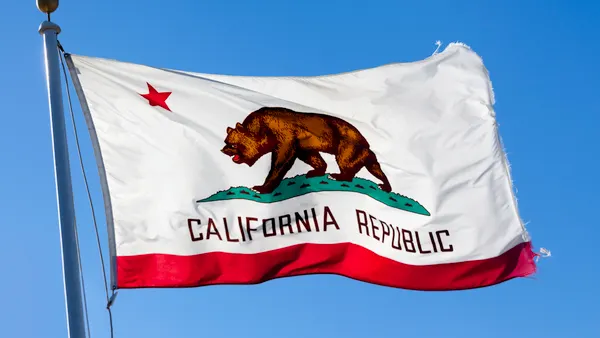Dive Brief:
-
Arizona Corporation Commission (ACC) Chairman Robert Burns and Commissioner Justin Olson on Monday issued two sets of draft rules detailing how the state could move forward with retail electric competition.
-
Monopoly utilities would not be allowed to participate in retail competition under the first proposal, Draft A, but could participate under Draft B.
-
The ACC is holding a workshop on the issue on Feb. 25, and stakeholders can file comments on the draft rules before then.
Dive Insight:
The ACC considered adopting a model of electric retail competition before, but abandoned the effort in 2013, after Arizona Public Service (APS) said competition could threaten grid reliability in the state. Last August, Burns instructed commission staff to put together a set of draft rules that could take Arizona to full retail electric competition.
Retail choice has been somewhat dismissed in the past in Arizona because of uncertainty around what the market would look like, Michelle De Blasi, executive director of the Arizona Energy Consortium, told Utility Dive. At the time, Arizona was much more isolated than other markets — but the introduction of the California Independent System Operator’s Energy Imbalance Market might have changed the mindset of some of the utilities, she said.
Both sets of draft rules put forward by the ACC would require electric service providers to get a Certificate of Convenience and Necessity, and have transmission and distribution systems continue to be regulated as a monopoly. In addition, both proposals would encourage market participants to "coordinate their plans and transactions through the Independent Scheduling Administrator, Independent System Operator, or its functional equivalent."
However, where they differ is on the participation of utilities. Under Draft A, electric service providers would operate in parallel to the utilities for a short term, after which the current utilities would not be allowed to provide direct electric service to customers, according to De Blasi.
"Draft B is broader and would allow both the current regulated utilities and other [electric service providers] to participate," she said.
"We would like to emphasize that these two proposals are only drafts and as such will require modifications, however, we also believe that they are a good starting point," the regulators said in the filing.
One of the challenges associated with having utilities unbundle transmission from generation is the issue of stranded assets, De Blasi said.
"We’ve got the sixth youngest coal fleet in the country, so trying to figure out how to unbundle those rates from the current customer rates that have been approved by the commission is a tricky process," she said.
The draft rules also differ in their treatment of customers — while all customers are eligible for customer choice under Draft A, Draft B would define an eligible customer as having a monthly demand of at least 100 kW, but allows all customers to participate by aggregating their load up to a threshold of 400 kW.
APS is reviewing the proposals and will participate in the regulatory process of exploring this issue, utility spokesperson Lily Quezada said in an emailed statement.
"We support a thorough analysis of all the potential impacts of deregulation and a close look at other states that have tried it. Based on their experiences, we believe Arizona’s current approach is better for customers, and that other stakeholders will agree after studying the issue," she said.
It’s good that the commission is providing options, De Blasi said, although it’s not entirely clear what either proposal would look like on the ground. The ACC will consider comments on the proposals at its Feb. 25 stakeholder meeting and "how this all ultimately shakes out will have to be seen," she said.














